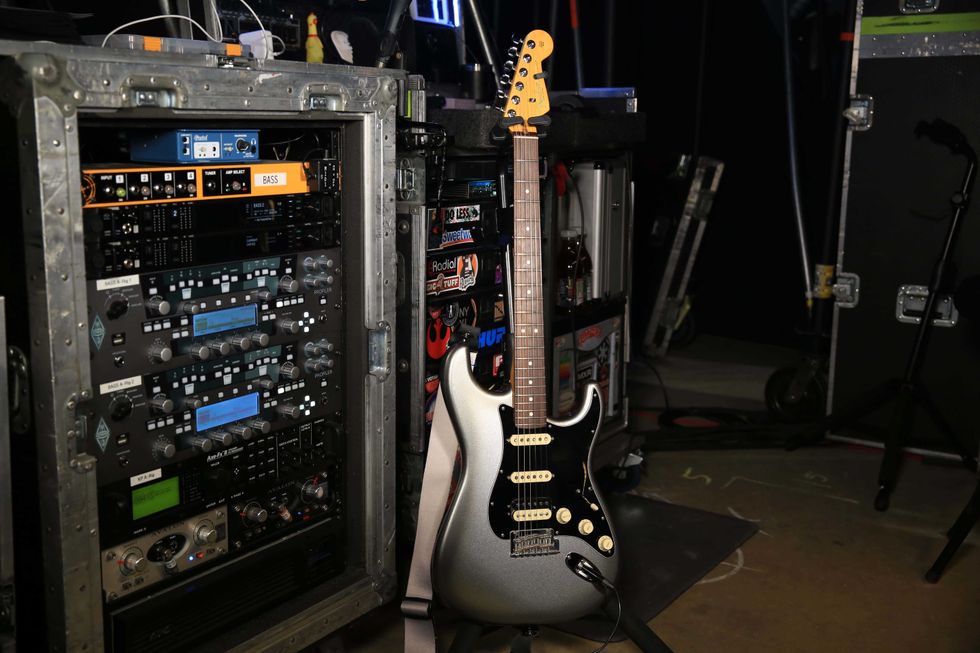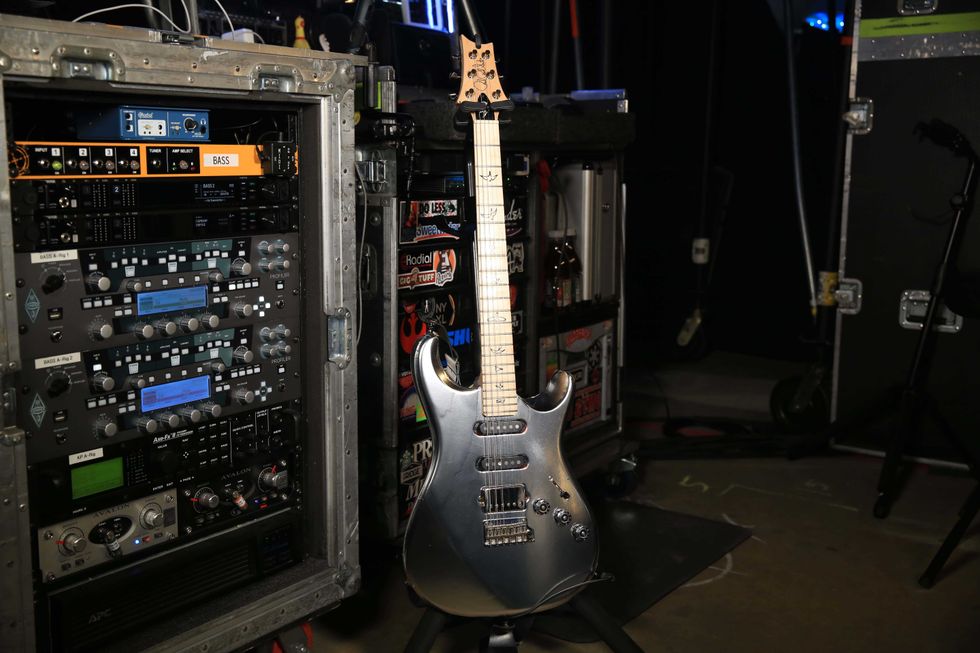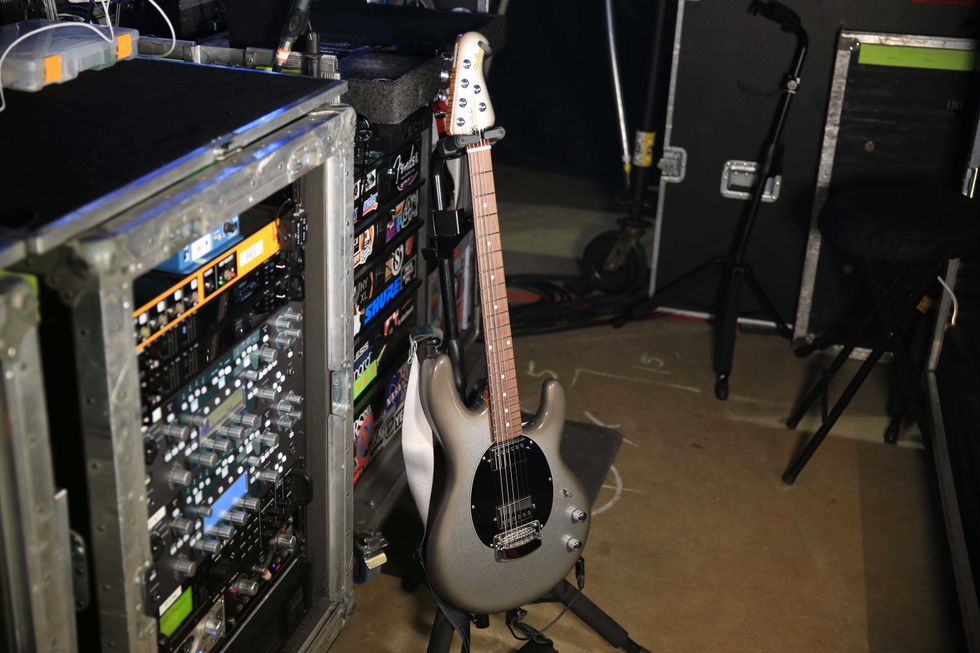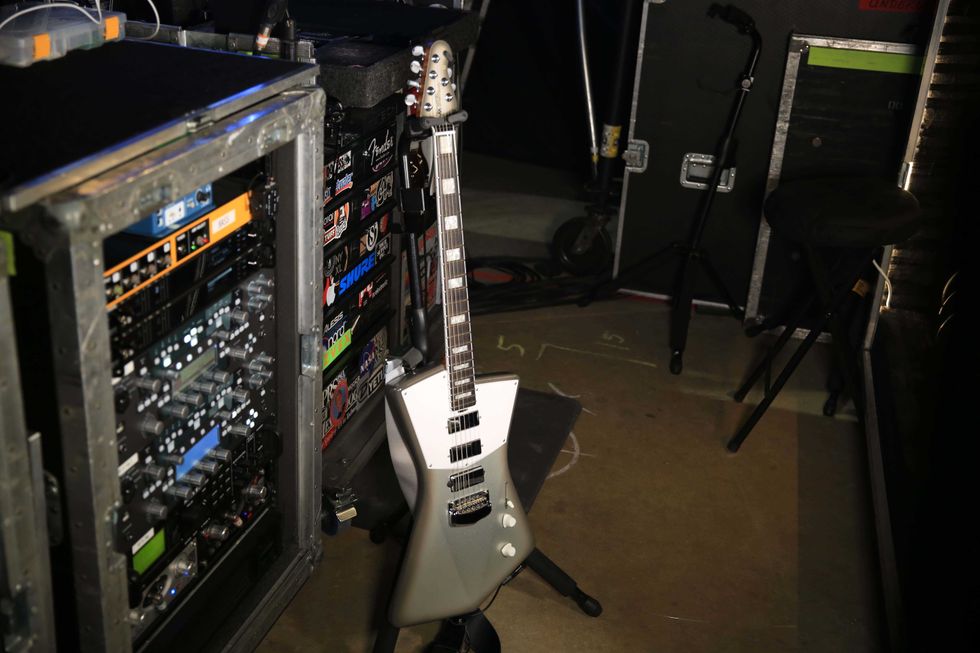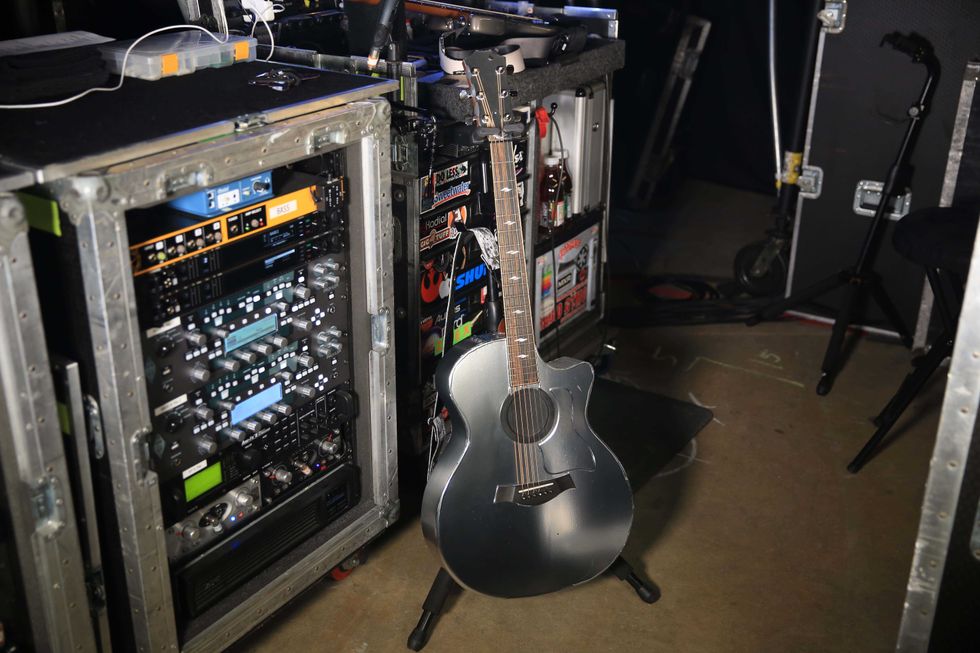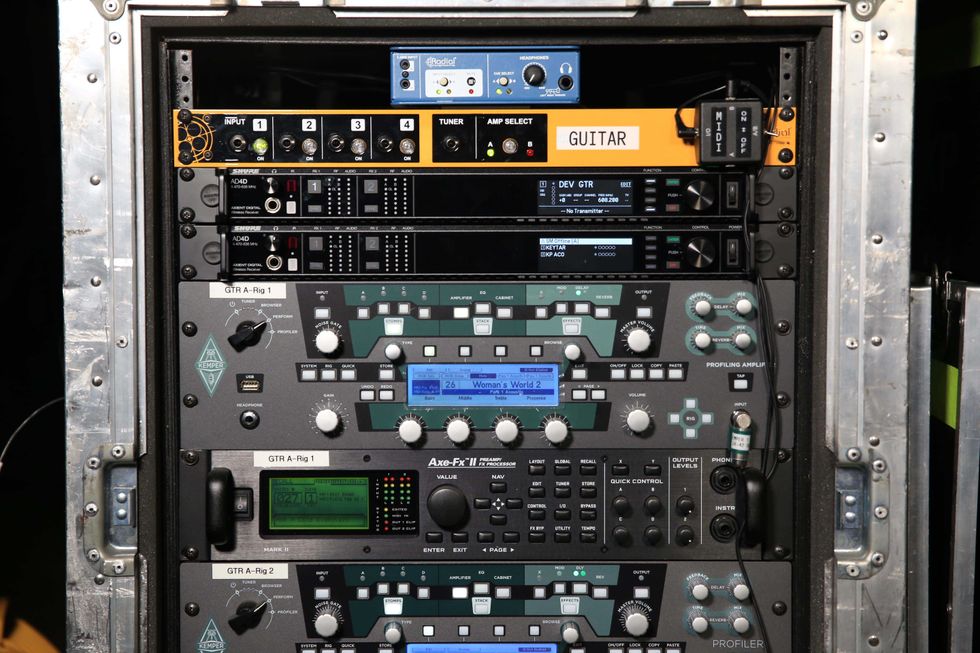Like many productions to come out of Dan Auerbach’s Easy Eye Sound Studio, Singing for My Supper by Early James sounds out of its time. That’s not to say that James’ music is wrapped in nostalgia for a bygone era or that it would easily fit into another period. Rather, the 26-year-old draws on characteristics of older styles—from spy-guitar riffage on “It Doesn’t Matter Now” to Grateful Dead–inspired psychedelia on the opener “Blue Pill Blues,” and even an occasional rumba vibe—and uses his raspy voice to his advantage as he reimagines an alternate history of 20th century music. As Auerbach told Premier Guitar: “James has that quirky, hard-to-pinpoint thing, but he’s so much his own character.”
While it’s probably that hard-to-pinpoint sound that drew Auerbach to the young guitarist, fate seems to have been involved in their meeting. In a convoluted turn of events that involves old roommates moving from James’ home of Birmingham, Alabama, to Nashville and passing along word of his music, a YouTube video made its way to Auerbach. The Black Keys’ frontman explains: “I just instantly knew. It wasn’t any one thing in particular. It was the whole thing: the fingerpicking, the tone of his voice, the way he was singing, the words he was singing … everything. I instantly reached out.”
It’s no surprise that James’ high and often-haunted-sounding voice would catch Auerbach’s ear. His personal style is reminiscent of the way iconoclastic artists such as Tom Waits and Bob Dylan have created their own unique voices, and it’s just as easy to imagine James’ voice on an early blues 78 as it is to hear him fronting a rock band.
James had done some touring as a duo with bassist Adrian Marmolejo and released his Early James and the Latest EP, but it was still a surprise to hear from Clay Bradley, his friend Katie Pruitt’s manager, who called him out of the blue. “I didn’t even know Clay,” says James. “I thought he was full of shit when he called me and said, ‘Hey man, can you come to Nashville and meet Dan Auerbach?’ I was like, ‘I think they’re trying to harvest my organs or something.’ But sure enough, I went up there and met the guy and played him a couple of the songs I’d written and he gave me a record deal.”
Singing for My Supper is the musical proof that the stars absolutely needed to align and bring the simpatico James and Auerbach into each other’s orbits. As is his usual modus operandi, Auerbach stacked the sessions with a crew of heavy-hitters that bring life to James’ disparate set of tunes inspired by influences far and wide. From the Tex-Mex feel of “Clockwork Town” to the lounge-y soul of “Stockholm Syndrome,” every track grooves thanks to the well-hewn pocket of veteran rhythm players such as drummer Gene Chrisman and bassist Dave Roe. And just because James doesn’t like guitar solos doesn’t mean that Singing for My Supper is not still very much a guitar album. In addition to the songwriter’s own superlative fingerstyle playing, songs overflow with three- or four-part guitar sections—courtesy of James and expert pickers Russ Pahl, Billy Sanford, Paul Franklin on steel, and Auerbach himself—full of licks, tricks, and guitarmonies oozing with warm, vintage tones.
We caught up with James as he was finishing a tour, and chatted a bit with Auerbach as well, in order to get all the details on how they crafted Singing for My Supper—from the songwriting to picking the right players to taking it on the road.
At 26-years-old, you’ve obviously digested a lot of influences and created your own voice out of them. Can you tell me how you developed your sound?
Early James: For a long time, I hated my singing voice and felt like I could hear my speaking voice in it. I wanted to make up my own voice.
I was really into Captain Beefheart and Howlin’ Wolf and blues singers. Captain Beefheart was trying to copy Howlin’ Wolf and Tom Waits has said that Howlin’ Wolf was his Jimi Hendrix. It took a long time, and I think I settled into this voice when I moved to Birmingham, when I was 21.
How about developing your guitar playing and songwriting?
I definitely hated guitar picks. I was super into Mississippi John Hurt, Les Paul, Chet Atkins, Jerry Reed, Roy Clark, all those Nashville pickers, just playing the whole song all on one guitar—the bass, the rhythm, and the lead. I just tried to figure out how to do that.
I watched a lot of YouTube videos and tried to make the guitar sound like a song instead of just a rhythm instrument. I’d slap the guitar because there was nobody to play with in Troy [Alabama]. There were no gigging musicians, or they were already established and didn’t want to play with a 16-year-old kid. They were playing in jam bands and bars and frat gigs. I just wanted to play and write my own songs, not that I didn’t do the four-hour gigs for awhile.
I had a buddy who was the frontman of Fire Mountain, and he said that if I started writing original songs, I could open for them. They were signed to a label, which was insane. He was like a celebrity.It was a super-small label, but it was still insane to me that I had a friend who was getting write-ups in Paste and places like that. When he said that, I quit doing cover gigs and started writing songs.
When did you stop using a pick?
Well, in Montgomery, Alabama, they had a Guitar Center King of the Blues competition, and I won the local one. I started off playing with a pick and, to try and impress them, I dropped the pick right in the beginning of the song and tried to play it off like it was an accident and finished. I figured I could only do that once, and at that point I stopped using a pick.
Your Early James and the Latest EP from 2017 has such a great sound. It’s really live and sounds like it was recorded in the ’50s.
We were about to go on tour and had nothing to sell. We had nothing online except YouTube videos. We did it last minute and didn’t dress it up at all. Adrian [Marmolejo, bassist] only had an hour to come record. He was on his lunch break. They were also doing construction outside, so me and Adrian recorded in the control room.
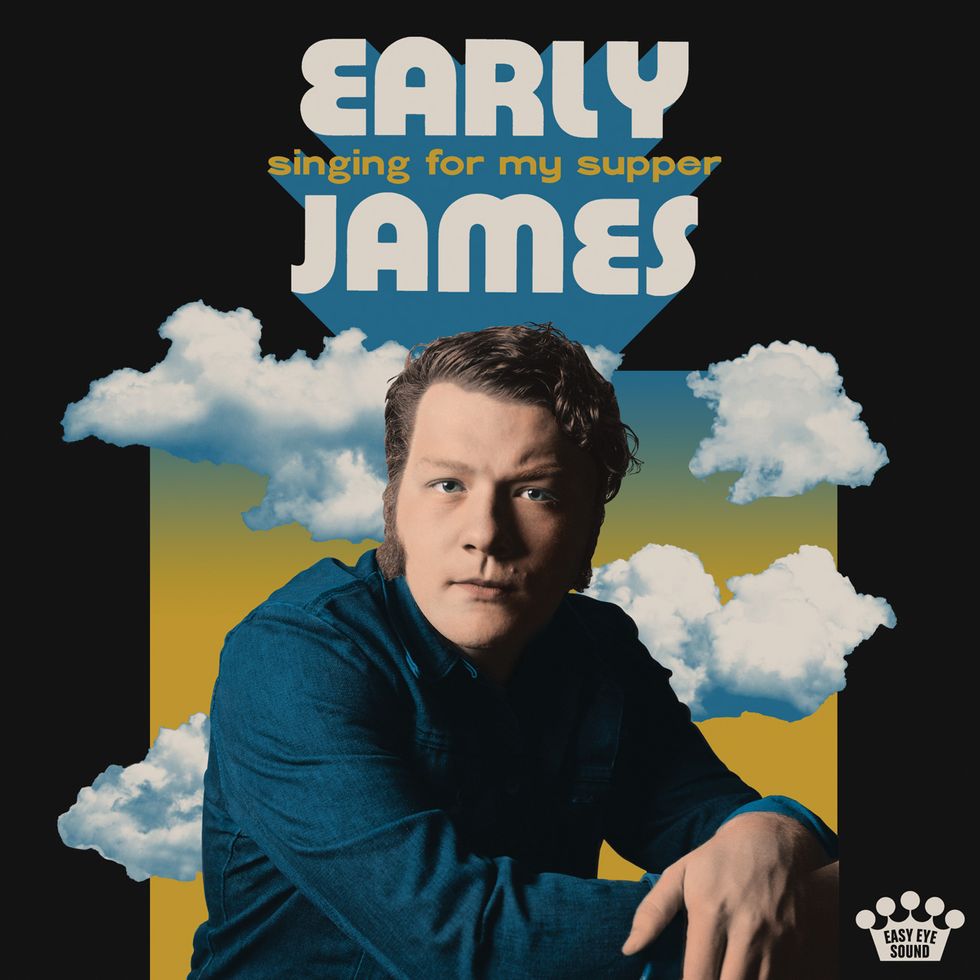
TIDBIT: While his full-length debut has 10 songs, James explains that he, Auerbach, and their crack cast of players cut nearly twice as many over two days.
We toured with that unmastered. Before it was put on Spotify, I was just printing discs and putting them in a brown paper bag and they were free or name-your-price for that first tour. Eventually, we got it all mixed and Jeff Powell at Sam Phillips Recording Service mastered it and did all that slapback-delay stuff. All that stuff wasn’t on there originally—the slapback and the reverb. That’s all that shit Johnny Cash was using, like the steel-plate reverb and the echo chamber with no parallel surfaces that looks like a Willy Wonka room.
Once you hooked up with Dan Auerbach, what was the collaboration process like for Singing for My Supper?
I was skeptical at first, because he famously doesn’t let you use your band. He has a style. He uses an all-star band. It’s insane the players he gets. They chart out the songs from demos by ear and within two or three takes, it’s done. We didn’t have to use a metronome or click. I think that makes it very alive and real.
We recorded almost 20 songs in a matter of two days. He’s a good listener. There were only a few times we disagreed and when we disagreed he listened to me. He’s good at wanting to do what the artist wants to do with their song.
He does have a streamlined process for everyone, but he does have wiggle room and wants the artist to be comfortable. It was nerve-wracking to be around all those folks. So many players who had just played with everybody. There was a moment when I froze and was like, “Who the hell am I? Why am I here right now?” But still, somehow, I was comfortable. They’re all just dudes and they don’t have any kind of celebrity. They’re super happy. They have this cool relevance where they’re making hip new records.
Gene [Chrisman, drummer] is in his 80s and he’s still pumping out records. That’s amazing to me. He’s still got it, man. He would come into the sound booth and be like, “Hey man, what’s the feel?” And I’m like, “You know! You’ve been doing this for 65 years.” But he’s so humble. Everybody there was like, “Is this cool if I do this?” And I’m like, “Of course it is! You’re badass. Keep doing what you’re doing.”
The touring version of James’ band, the Latest, includes bassist Adrian Marmolejo (not pictured), drummer Joey Rudisell, and steel-guitar and 6-string player Ford Boswell. “I think we’re forced to be a little more dynamic to make it work,” says James of playing his new songs in a live setting. “There’s a lot more space, and we do a lot more abrupt stops to make it sound fuller.” Photo by Steve Rose
The songs on Singing for My Supper don’t easily fit into one style. Each one seems to create its own musical universe, but they all flow together really well. What are your thoughts on genre?
As far as genre goes, I like a lot of everything. I wanted to have a psychedelic/country/jazz/folk album—just hodgepodge it together and see if it works, and it came out pretty good, I think.
All those songs were written and played as an acoustic duo—upright bass and acoustic guitar. Everyone was calling us bluegrass, but I couldn’t wait until we had electric guitars and a drummer. I would hit the guitar to give songs a train beat, or just try and play a drumbeat, and now I don’t have to do that. But I think writing them on acoustic helped them end up with weird time signatures or weird breaks because I didn’t have to cue a drummer.
As much as Dan is the producer and you entered his world for this, you obviously still have some strong aesthetic opinions. How did you and Dan decide the sound of a song when you recorded?
I think the songs, the demos of them, decided it early on. I specifically said, “I’m tired of being called a throwback artist,” and I wanted this to be a weird record that makes people not really know what direction I could go in, and I think we did that. Me and Dan are really into the same kind of music and he was also a huge influence on me in high school. That was the first show I ever went to: the Black Keys, the Whigs, and the Kings of Leon. I remember freaking out.
I think Dan wanted the psychedelic vibe just like I did on some of them, and the crooner vibe on some of them. We didn’t talk about it. We just nodded our heads or I’d say, “No, that’s not it,” but there wasn’t a lot of talk. It just happened.
A lot of the songs on Singing for My Supper have three or four guitar parts. They’re all really refined and tasteful, almost like you have a string section made up of guitars.
Yeah. I don’t think there’s a guitar solo on the whole record. I kind of hate guitar solos, honestly.
Russ Pahl … I’d heard him on records and didn’t know who he was. He would lay down a fingerpicking thing and Billy Sanford would play a Fender Bass VI and Dan would come up with an idea. They’d tuck a little nugget of guitar gold in there. It’d be recorded live and they’d add piece by piece, and say, “Patch me in right here,” and it just happened. It is like a little string section and that happened organically.
Did you write any of those harmonized guitar lines or were they all just things that someone played live like that?
I’d just have the main riff figured out. I didn’t write any of it, and I don’t think they wrote any of it. They just improvised it. They’d just perfect it. They’d hear the idea and take it out and put it back in how they thought it should be.
There were a few songs, like “Gone Like a Ghost,” where Dan came up with that descending line, he’s just mimicking the chorus melody, so I guess I technically wrote that with my voice.
What was your rig on the album?
I played my Martin D-16. The electric I used every time was a 1964 Guild Starfire III. Dan ended up giving it to me. I fell in love with it and played it on every song. I can’t put that guitar down. He’d gotten it set up with .013s and it felt like an acoustic guitar, real beefy. I ran that through a mid-’60s Deluxe Reverb and I didn’t use any pedals.
My live rig is just a tuner pedal, that Strymon Flint, a Memory Toy Delay for some slapback, and I have a Soul Food for just a clean boost. I didn’t even bring my rig for the record.

Guitars
1964 Guild Starfire III
2012 Martin D-16
Fender Baja Telecaster
Loar LH-309
Southside Custom S-style
Tagima T-855
Amps
Mid-1960s Fender Deluxe Reverb
Effects
Strymon Flint
Electro-Harmonix Memory Toy
Electro-Harmonix Soul Food
Strings and Picks
Fender Bullets (.011–.049)
Various brands of .013 string sets for archtop
Is your Martin a recent model?
I would guess it’s a 2012. It was given to me by kind of a stranger. I’ve been playing this gig ever since I moved to Birmingham, and the guy had been coming there and hearing me play for like five years, and about a year ago, he left it onstage when I was taking a smoke break and it just had this handwritten letter. I barely know this guy. He’s a musician, too, and it was like, “Hey James, I’ve been hearing you for the past several years. I hope you can accomplish more with this guitar than I ever did. Signed, John.” And now I have a real acoustic! I had mainly used Recording Kings, not that they’re bad. They’re really good workhorse guitars for the road, but that Martin is pretty special to me, just for that reason.
It looks like live you’ve been playing that blue T-style?
That’s a Tagima. They’re handmade in Brazil. It’s a Tele copy. It has a 4-way split with Seymour Duncans in it. They rock. They have a lot of cheaper ones, but the ones made in Brazil play just as nice as American Standard Teles. I only paid $300, but it plays like a $1,000 guitar.
I also have a Loar. It’s a copy of an ES-350. And I use a Mexico-made Baja Tele. This guy in town, Tom Gauldin of Southside Customs.… I’ve been messing around with a gray guitar he built. It’s like a ’50s Strat. He gets Warmoth necks and buys all the pickups and assembles it. He customizes whatever you want.
Can you tell me about your band? The bassist is the same person from your previous release, right?
Yeah, that’s Adrian Marmolejo. He just plays electric bass now. We all played together in other bands in Birmingham. Joey Rudisell is playing drums. He’d just gotten off tour with the Banditos. We’d tried some other drummers, but Joey can do anything and is more of a traditional rock ’n’ roll drummer, and that made sense to play the songs on the record. He’s also just a lot of fun to tour with. Ford Boswell, he’s on triple duty. He just started singing harmonies, too. He plays pedal steel and electric guitar.
What’s it like taking this album you made with a studio band and having to put together a live band around it? Does it make organizing the music different than if you’d written it for them?
I gave them the record to listen to and practice to, and it’s a reference point, but the more we tried to sound like the album, the more it sounded forced. I think they inherently thought they were supposed to play the album, but we can’t. So I just asked them to come up with parts that they’re comfortable with. Ford plays a lot of parts that aren’t on the record on pedal steel that he just came up with.
I think we’re forced to be a little more dynamic to make it work. There’s a lot more space, and we do a lot more abrupt stops to make it sound fuller. I don’t have room to bring an acoustic, so on songs like “High Horse” and any of the ones I play acoustic, I’m forced to play electric so those songs are a little more rockin’ than they are on the record.
When I go see a band, I don’t want to hear the record, because you can’t. I wanted the EP to sound exactly like what we sounded like live so there wouldn’t be any disparity between the listener who heard it on Spotify and the listener who saw us live. But I just killed that idea in my head. There’s the record and you can have fun and do whatever you want in the studio, and then you recreate it live in a different way.
I would love to do a live album with the four piece of the whole record. It’s a lot more rock ’n’ roll and to the point, just because we have to be.
Early James and his band play a live, stripped-down version of “Clockwork Town” from Singing for My Supper. A heavy drum groove propels the tune, making the vibe a little more rock ’n’ roll than on the album, and James uses his blue Tagima T-style to evoke a spaghetti Western tone for the intro. Dig the dual guitar line when Ford Boswell joins James on the melody line at 1:57.
“The whole album is pretty stripped-down in terms of instrumentation and I wanted it to be that way,” says producer Dan Auerbach. “I wanted it to be easily translatable onstage. A lot of those quirky changes and odd little things are James’ things.” Photo by Alysse Gafkjen
Dan Auerbach’s Room Full of Love
Here’s what Dan Auerbach had to say about producing Early James’ full-length debut at his Easy Eye Sound Studio in Nashville.Early comes at every song from a different angle, but they’re all related to his sound and personality as a player and as a singer and songwriter.
Dan Auerbach: Oh yeah, it’s all him. You hear traces of things. Every time he goes on tour with somebody, he gets the reputation of being a musician’s musician. All the musicians that he’s opening for are falling in love with him. You just know it when you hear that voice coming out of the speakers. You just can’t deny it.
Going into the sessions for Singing for My Supper, did you have a vision for what the album you’d make would sound like?
I had an idea and I had things that I loved about his music that I didn’t want to mess up. But there were also things that I thought we could accentuate and do it easily and in an organic way. The whole album is pretty stripped-down in terms of instrumentation and I wanted it to be that way. I wanted it to be easily translatable onstage. A lot of those quirky changes and odd little things are James’ things.
Ultimately, I wanted something that would groove, because he’s got such a groovy right hand. He can really lay the rhythm down in a crazy way with the clawhammer. The picking that he does is really unique. Having a nice rhythm section complement that can take that to new places. Beyond that, I just tried to fill the room with people I really love who I thought would be able to contribute.
As a producer, how much planning goes into a production in general?
I’ve been putting together studio bands for the last five years here in town and getting a crew together and getting a rhythm section going, working with this whole cast of characters, so that’s a big part of it. But the most important part is the songs and that we know how the songs go and we know where all the changes are. That allows us to really be free and create, and we’re not bogged down by writing, but we actually get to enjoy it and create. I like to keep it like that.
What does it mean to you to have created this crew of predominately older players you work with, bringing them into your musical world, which consists of a lot of younger musicians?
They created the world. I’m just living in it, and I am truly blessed. It’s one of the greatest pleasures of my life to get to work with some of these people. I lived in Nashville for nine years and I didn’t start working with these guys until I finally slowed down with the Black Keys. It’s been such a learning experience. It’s amazing. I can’t even tell you how incredible it’s been to work with guys like Bobby Wood, Gene Chrisman, Billy Sanford. It’ll change your perspective on things.
What guitar and amp were you using on Singing for My Supper?
We used that Guild Starfire a bunch. That became James’ thing on this record. He was really getting a sound out of it. I told him to just take that one. He got a good sound out of it. I’d just had it set up and it was waiting for him when the session started. I played my 1960 Tele a bunch.
I played my Gretsch Country Gentleman a bunch and my gut-string acoustic and my ’49 Epiphone acoustic, which I’ve been using a lot lately. I used my silverface Deluxe and my Flot-A-Tone amp.
There are really cool layered guitar harmonies on Singing for My Supper, which highlight some of the lines that were played while making the basic tracks.
When you work with people like Billy Sanford and Bobby Wood, who are geniuses, it’s not that they just heard that and say, “hey, I’ve got a cool idea,” but as it was going down, they knew that it was a three-part harmony that they were about to do. These are not normal people. They’re Dr. John–level. It’s eye-opening and game-changing to be able to work with them. They aren’t touring musicians. They don’t get gratification from audiences. They get gratification from coming up with brand new material that hits people. That’s what they live for.
Bobby Wood is 76 years old. We’re in the middle of a pandemic and he called me up yesterday and said, “I think I’ve got a good idea for a hit.” He said, “You want me to send you an audio file?” And I said, “Hell yes, I do. Send it to me.”
But we can only be as good as the artist we’re there working with, and Early raises the bar on every level. From the songwriting to the lyrics to the changes, nothing can be stock, and his music, his vision won’t allow it. He’s a challenging artist who brought out the best in everyone.




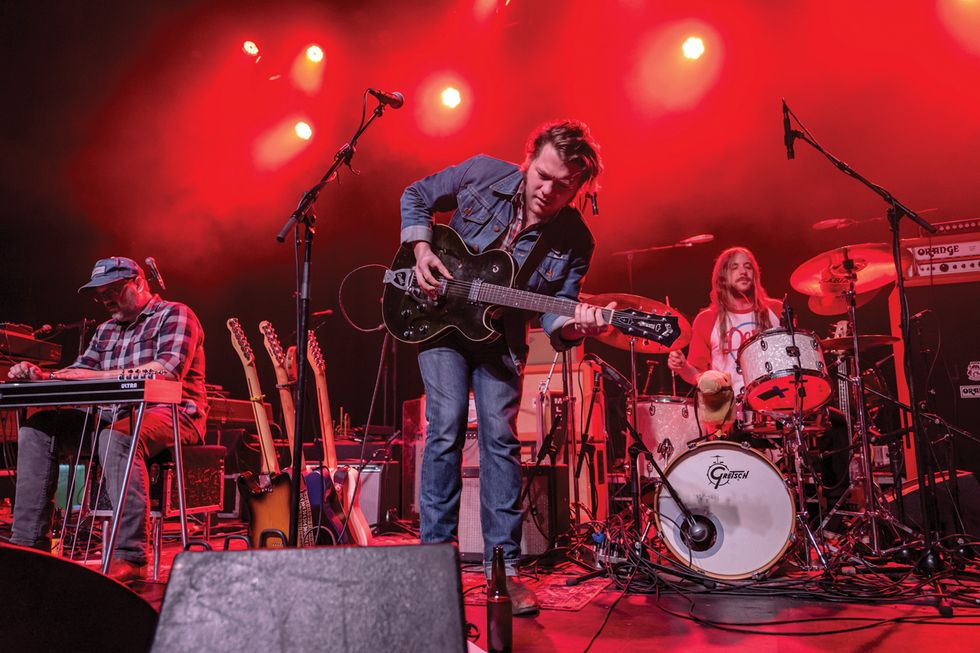
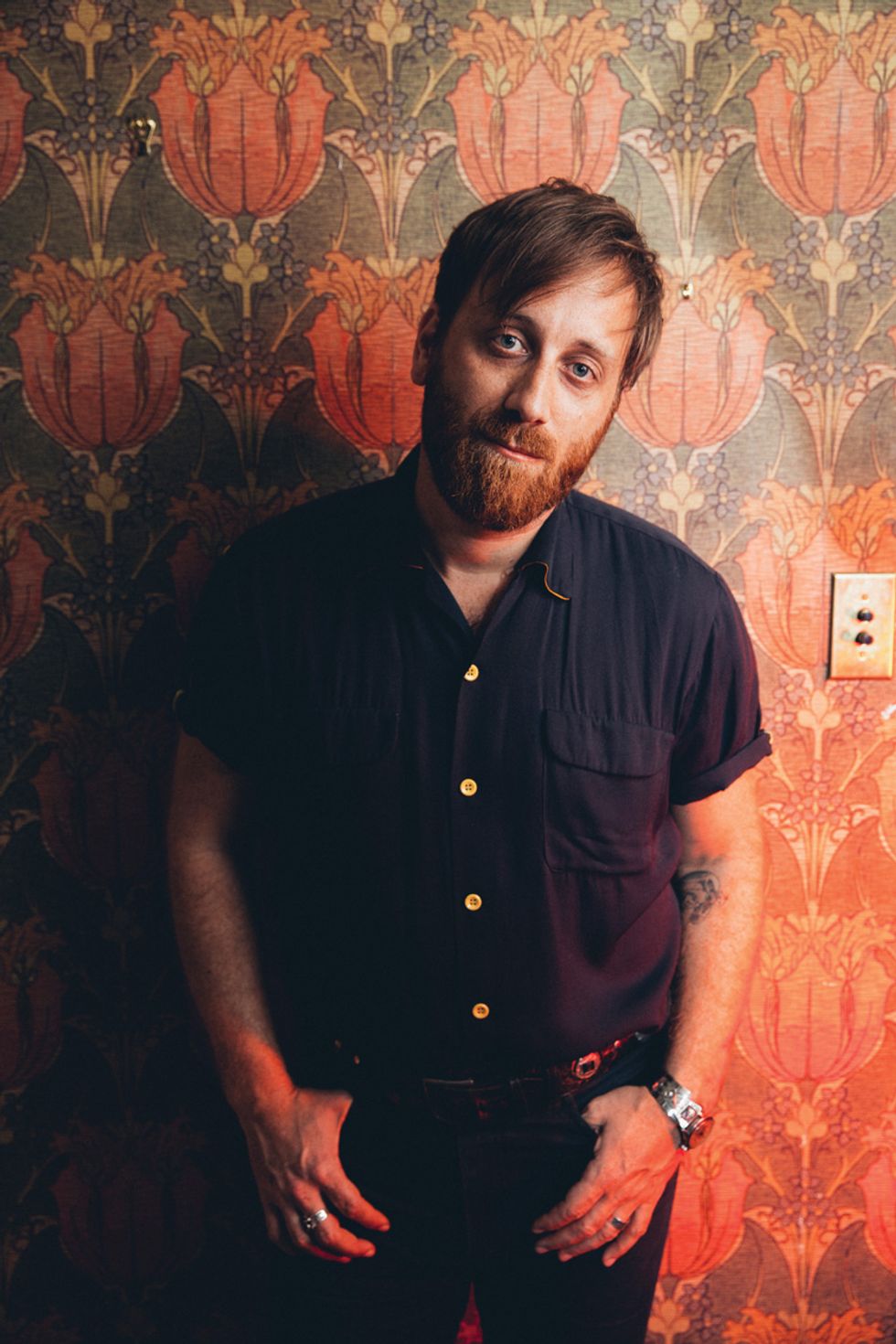





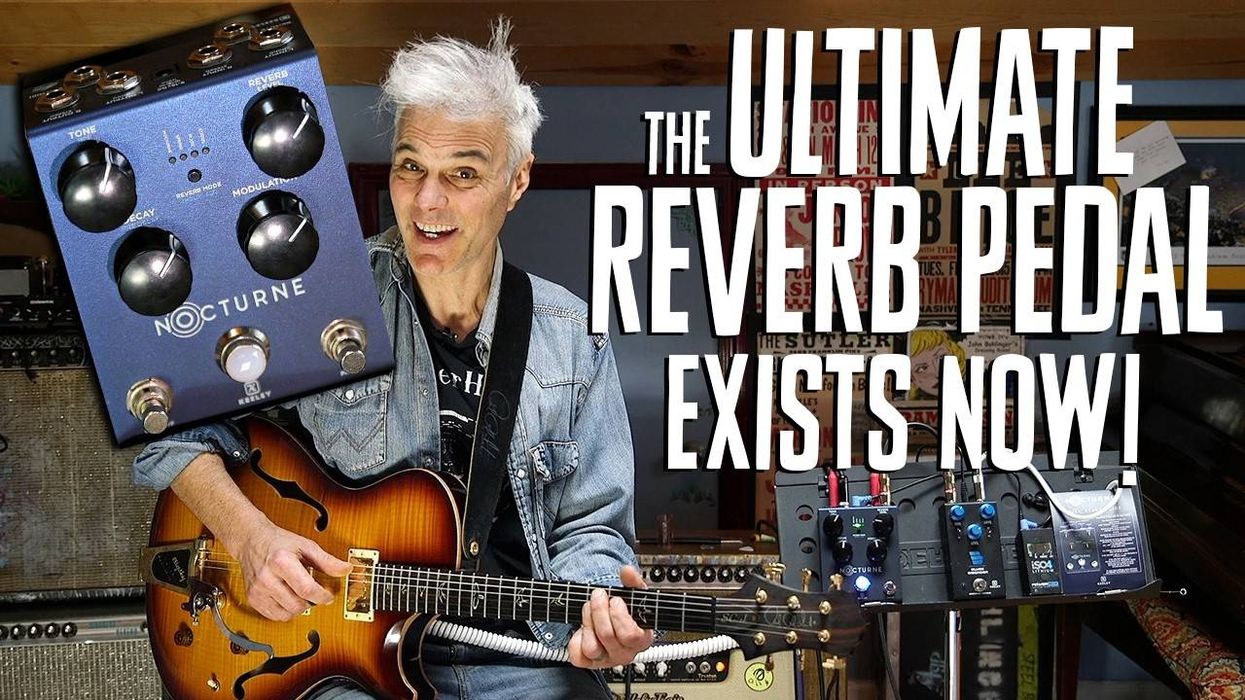
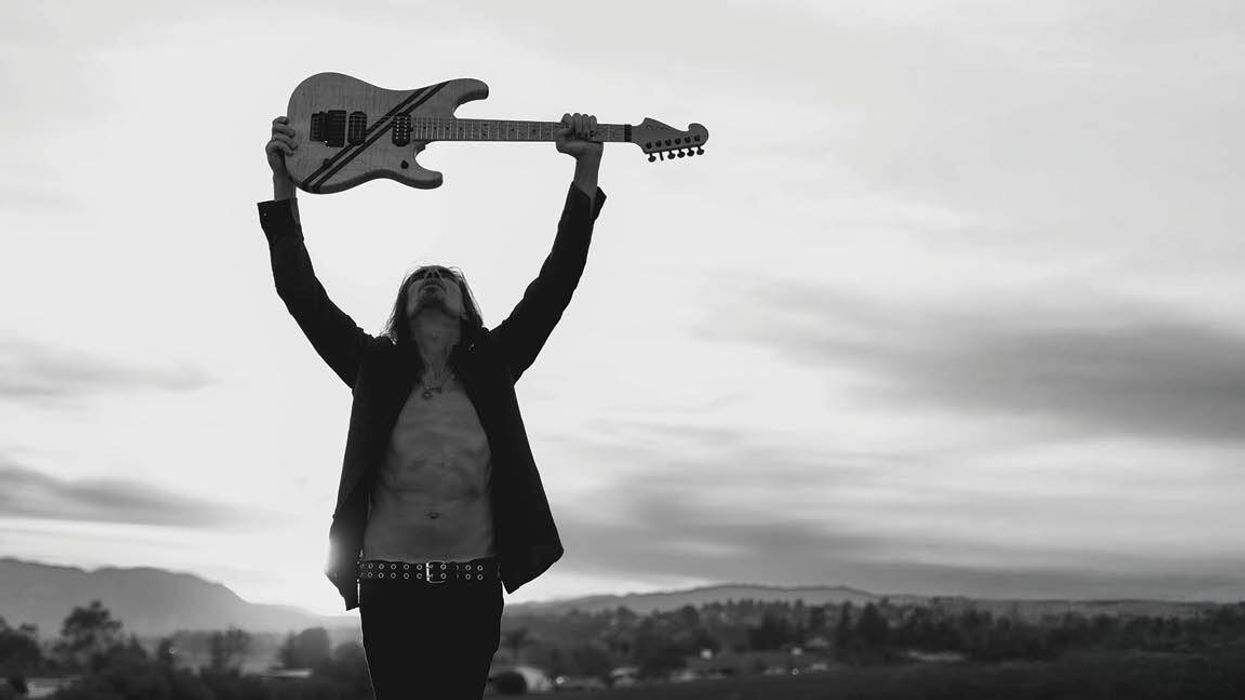
![Rig Rundown: Russian Circles’ Mike Sullivan [2025]](https://www.premierguitar.com/media-library/youtube.jpg?id=62303631&width=1245&height=700&quality=70&coordinates=0%2C0%2C0%2C0)
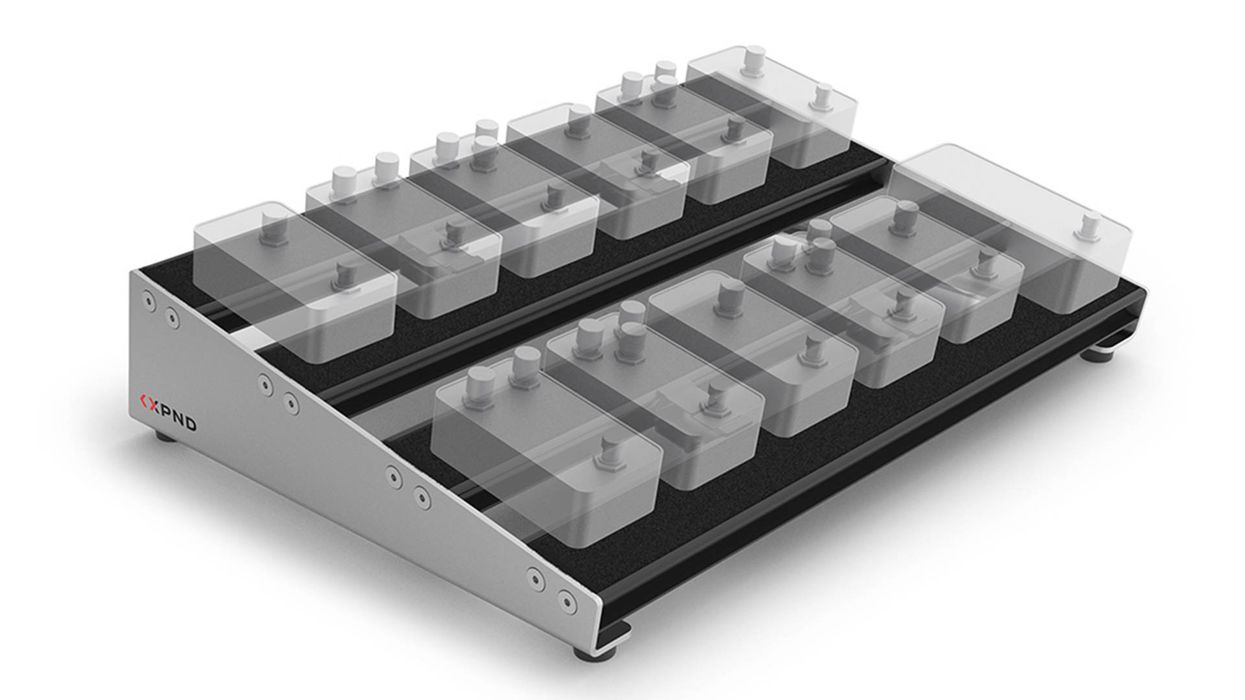


![Rig Rundown: AFI [2025]](https://www.premierguitar.com/media-library/youtube.jpg?id=62064741&width=1245&height=700&quality=70&coordinates=0%2C0%2C0%2C0)












 Shop Scott's Rig
Shop Scott's Rig







 Zach loves his Sovtek Mig 60 head, which he plays through a cab he built himself at a pipe-organ shop in Denver. Every glue joint is lined with thin leather for maximum air tightness, and it’s stocked with Celestion G12M Greenback speakers.
Zach loves his Sovtek Mig 60 head, which he plays through a cab he built himself at a pipe-organ shop in Denver. Every glue joint is lined with thin leather for maximum air tightness, and it’s stocked with Celestion G12M Greenback speakers.












![Devon Eisenbarger [Katy Perry] Rig Rundown](https://www.premierguitar.com/media-library/youtube.jpg?id=61774583&width=1245&height=700&quality=70&coordinates=0%2C0%2C0%2C0)
